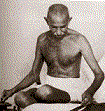A Background to Withdrawal
At the start of World War 2, some negotiations took place which led to the agreement that India would be given Dominion status as soon as possible in return for cooperation from the Hindu and Muslim factions in India against the German forces. Unfortunately, tensions in India would not support a whole India containing both factions and the Muslim factions pressed for a separate state for the Muslim population.
The Proclamation of War proclaimed on 3rd September 1939 by Viceroy Linlithgow was made without consulting Indian leaders or the central legislature but constitutionally no fault could be found with this. Although such consultation would probably have made little difference, it may have been a mistake not to consult. The majority of educated Indians or the congressmen were more aware of Hitler's beliefs than they had been with the Kaiser in 1914, and despite pressure from the Working Committee to refrain from assisting in the defence of the British Empire against German aggression, there was much more genuine desire to play a part against the Nazis.
Gandhi reflected the popular mood and was willing to support the British and French, but only morally. His belief in non-violence was precluding anything else.
The Muslim League felt unable to offer unconditional cooperation, meeting three days after the Congress resolution to offer full support with the price being an independent India. Muslim support was to be given only if Muslims were given 'justice and fair play' and they warned that no advance to Independence would be made without their approval. But the Muslim premiers of Bengal and Punjab pledged their provinces to unconditional support of the allied cause, as did the Muslim Premier of Sind. The Princes assured the Viceroy of their support, either individually or through the Chamber of Princes.
Following interviews with over fifty Indian leaders, Linlithgow stated that the British war aims had not yet been defined, but that British policy in India still retained the goal of Dominion status, and promised that at the end of the war modifications of the 1935 Act would be considered in the light of Indian views. In the meanwhile, a consultative group would be established representative of all major political parties and princes. This was an ill-calculated statement and provoked the Congressmen to resign, and the provinces returned to the pre-Montagu-Chelmsford reforms bureaucracy.
Despite Linlithingows' statement, the Muslim faction would not side with Congress to try and prevent cooperation with the British and instead they asked for further clarification and insisted that the federal part of the 1935 Act should not be merely open to modification, but scrapped altogether.

The fall of France and entry of Italy into the war excited Congress and induced a more cooperative attitude. Gandhi was adamant though, that India would not take advantage of Britain's troubles, wanting Britain to fight the Nazis without arms and to allow the Nazis and Italians into Britain. At this point, the first week of June 1940, the Congress Working Committee decided to break with Gandhi over this issue and offered to throw its full weight behind the defence of Britain on two conditions; the declaration of a fully independent India to take effect after the war, and secondly, more immediately, the formation of 'a provisional National Government at the Centre which...should be such as to command the confidence of all the elected elements in the Central Legislature'.
Linlithgow drafted a memorandum which would have led to Indian independence within a year of the end of the war, and acknowledge that it was for the Indian, not the British, to frame a new constitution for India, and also formed a War Advisory Council. The British government's mangling of the document removed all time frames for Dominion status. However, this important passage was included and designed to appeal to the Muslims, but it was galling to Congress.
It goes without saying that they {the British Government} could not contemplate transfer of their present responsibilities for the peace and welfare of India to any system of government whose authority is directly denied by large and powerful elements in India's national life. Nor could they be parties to the coercion of such elements into submission to such a Government.
Congress rejected it immediately, but the Muslims accepted it as the basis for full cooperation. Gandhi started, having been refused permission to call upon the people of India to refrain from assisting India's war effort, a campaign making anti-war speeches in outward villages causing the minimum of inconvenience and anxiety to the British. Linlithgow then had the speakers arrested and imprisoned under the Defence of India Rules and forbade the press from reporting the progress of the campaign. Gandhi now called upon the people of India to resist the war, but the muzzling of the press reduced the effects of the campaign on India's war effort to virtually nothing.

Congress attempts to prevent the Indian populace from joining the war effort failed in the face of businessmen wishing to make money out of the war effort and the peasant population seeking employment in the expanding munitions industry and army. Auchinleck became Commander-in-Chief of the Indian army and drove through radical reforms that raised the Indian Army strength, ultimately from 190,000 to over 2 million. Linlithgow also established an Eastern Supply Group in October 1940 with all British territories and Dominions east of Suez. Indian industrial output increased rapidly hereafter. In summer of 1941, Linlithgow ignored the non-cooperative political parties and enlarged his council by the inclusion of non-official Indians and also formed a National Defence Council. Initially the Punjabis did not have a member on the council, but some threats and the tendering of resignations got Linlithgow to include a Punjabi as one of the new members. On 3rd December 1941, the remaining incarcerated campaigners from earlier in 1940 were all released after pressure from the Indian members of Linlithgow's Advisory Council.
When Japan began its advance on British holdings in December 1941, US and Chinese pressure grew to get Britain to declare Indian a Dominion in view of evidence that without freedom, a Japanese invasion of India might be met with no resistance. This pressure, and the problem of fighting three separate wars at once, forced the Government into a declaration of integrating representatives of their political parties into the Viceroy's Council, and included an unambiguous assurance of independence after the war.
Sir Stafford Cripps was sent to India, but his hopes of success were poor. Gandhi continued to try and prevent the organization of India for war. Problems occurred throughout the negotiations and in the end they failed. One of the main problems was being the inclusion of an Indian participation in the defence organization. The British in Burma were in full retreat flooding back into north-east India encumbered by thousands of refugees.
Following the realization by Indian politicians that if India fell into Japanese hands, China would be throttled as Germany and Japan linked up through Iran and Iraq and Russia would be threatened on two fronts. Even Gandhi modified his stand, to allow Allied troops to remain on Indian soil to defend India if the British Government freed India.
The Congress now passed a resolution proposing the immediate withdrawal of British rule, and if this was not accepted, it would utilise all of its non-violent strength for the vindication of political rights and liberties. Gandhi endorsed the resolution, but it was greeted throughout the country by widespread alarm and disapproval. On 8th August, the All-India Congress Committee met at Bombay and in an amplified and slightly amended form the Wardha 'Quit India resolution was passed.
With unanimous approval of all eleven Indian members of the Executive Council, all members of the Working Committee and most other Congress leaders were arrested. The All-India Congress Committee and the provincial Congress Committee were declared unlawful associations. Gandhi was surprised and aggrieved to be led into detention at the Aga Khan's palace at Poona and many of the Congress delegates guessed they would be arrested before they reached home. Organized plans for a total rebellion in India were not implemented due to the Congress being incarcerated before it could begin, and widespread violence and sabotage took place. In most parts of the country, the disturbances were short-lived and confined to fairly limited areas, but in the eastern districts of the United Provinces and Bihar disruption was extremely grave. By the end of August control had been reestablished and by 21st September the 'Quit India' movement had been crushed by both the loyal police and army. Civilian casualties were light, and the majority of activists were party members and students. A minute portion of the population the Gandhi movement, did nothing to help his cause. It even drove the Hindu and Muslim populations further apart and gave rein to violence over non-violence.
Gandhi fasted to try and convince Linlithgow of the Governments fault in the riots, which he claimed were precipitated by the arrest of the Congress party, despite the fact that the sabotage was plainly well-prepared in advance and too-well coordinated to be random acts of outrage. Linlithgow was not convinced by the fast, and although Gandhi survived he suffered a major defeat, failing to convince Linlithgow of his innocence or wring any concessions from him.
The defeat of Gandhi's fast and the 'Quit India' movement led to a relatively peaceful period in India's war. Linlithgow passed the Viceroyship over to Wavell. Following the arrival of General Slim as C-in-C India, the Indian Army began to gain morale and efficiency from this man's leadership and the prospect of victory in the Far East and the recapture of Burma actually became more of a possibility than defeat. In May 1944 Gandhi was released unconditionally, on medical grounds, after a severe attack of Malaria.
Gandhi again tried to get Britain to withdraw from all but military operations, which did not incur financial debts to India, Government operations. This was rejected. Gandhi and the pro-Pakistan group still disagreed on the size and time of a separated Pakistan. Wavell tried to convince the government of the day to move on the Indian issue, but failed completely. After six months of put-offs and postponements he threatened to resign when the Government tried to postpone again his proposals for an independent India and an interim council of himself, the Commander-in-Chief, six Muslims, six Hindus, one Sikh and one representative of the depressed classes. Two months of discussions got nowhere with the India Committee until the last two days of May, when after Victory in Europe his proposals were approved in full by Churchill, who was assured they would fail.
When Wavell returned to India he organized the Simla conference and in a broadcast invited Indian political leaders to take counsel with him with a view to forming a new Executive Council, with its main tasks of prosecuting the war with Japan with the utmost alacrity and to consider the question of post-war development of India. The invitations were accepted and the conference assembled on 25th June.
The Indian political parties agreed to his proposals but because of intransigence on Jinnah's part, the leader of the Muslim faction. Wavell closed the conference on July 14th and declared its failure, but it was a turning point in Government-Congress relations. Following the end of the War in the Far East with the surrender of Japan, the new Labour Government in Britain recalled Wavell for talks on the future of India.



